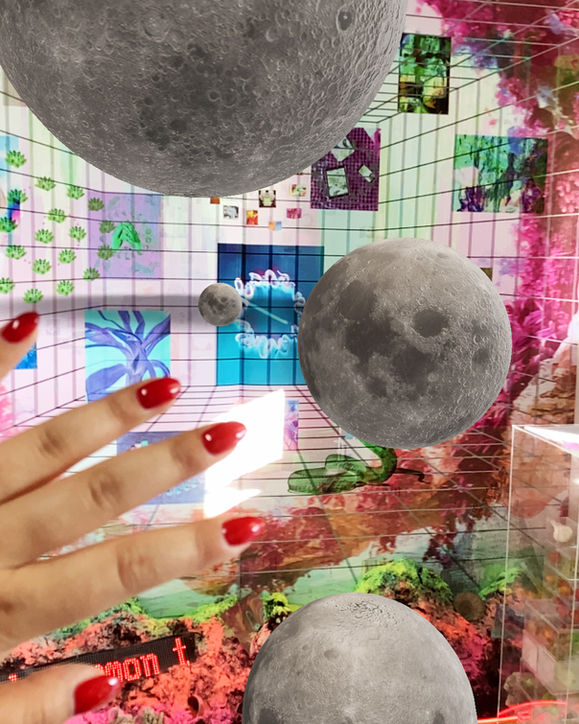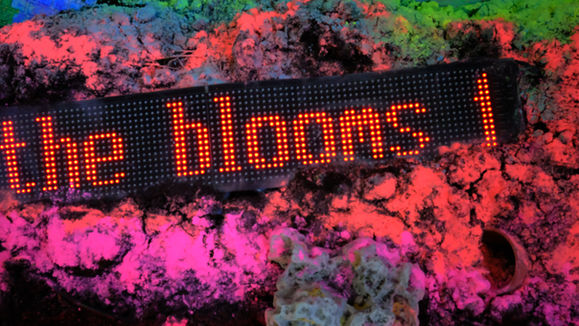
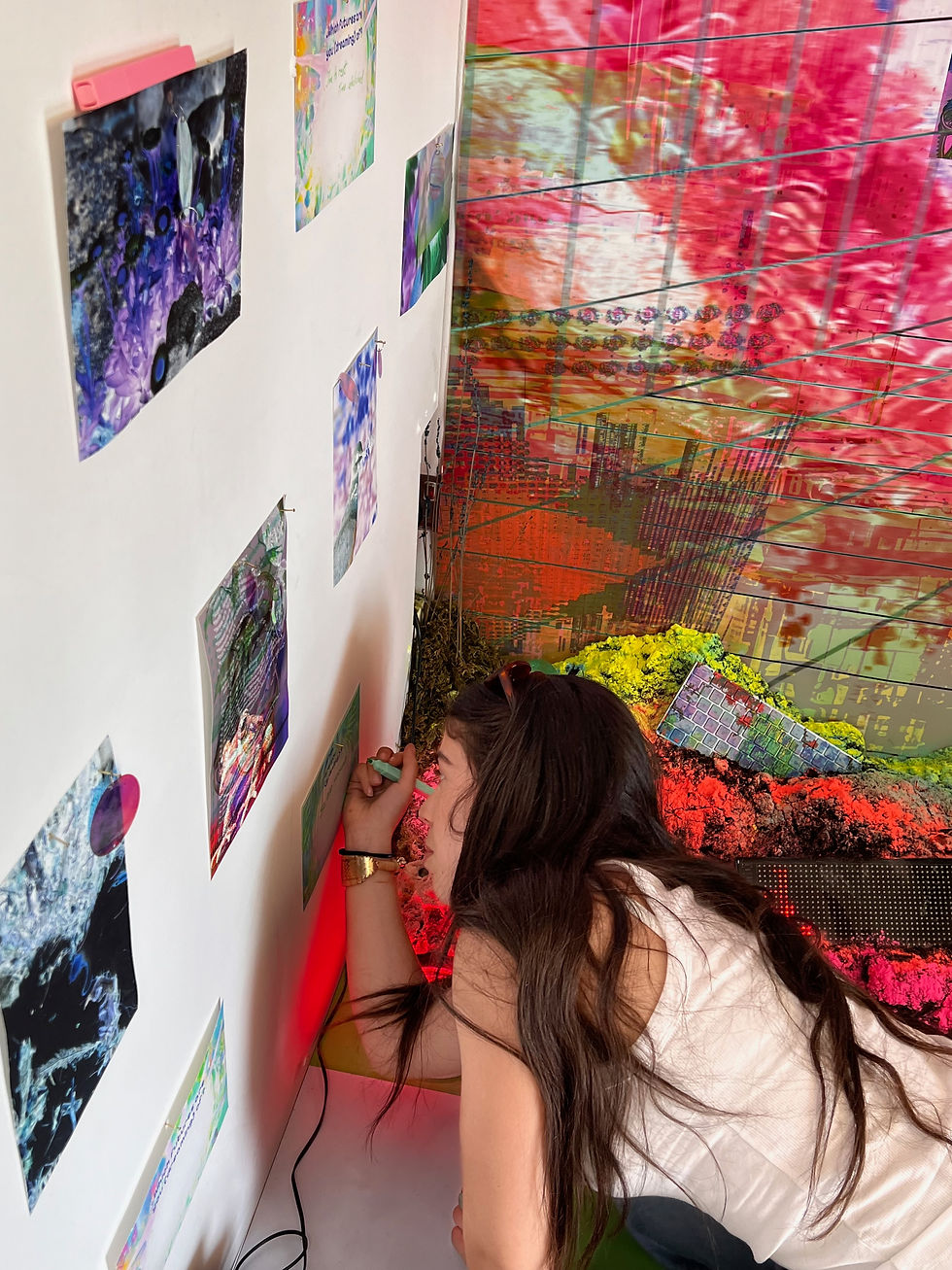
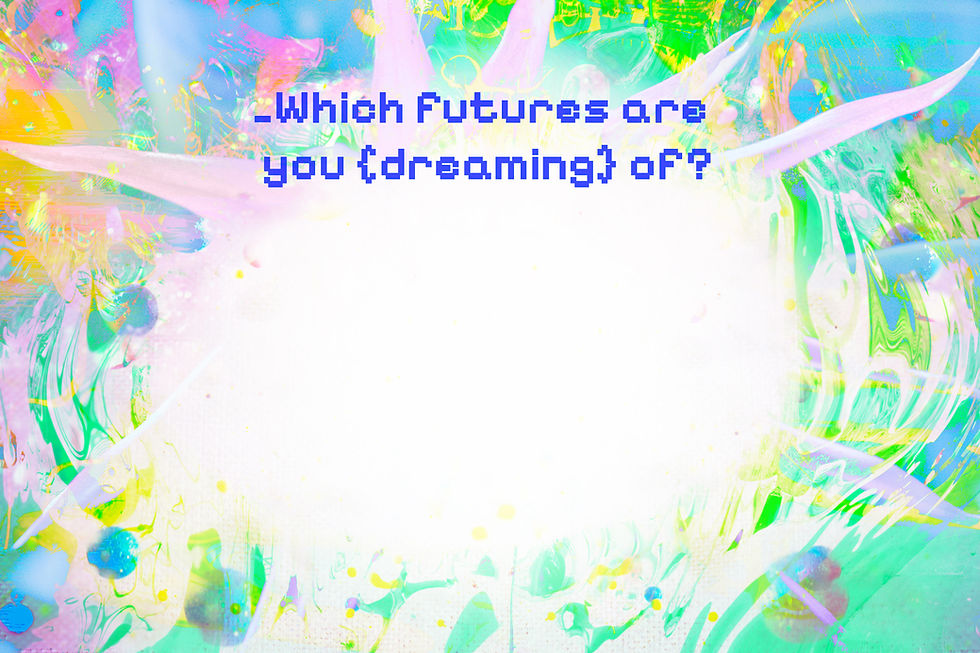
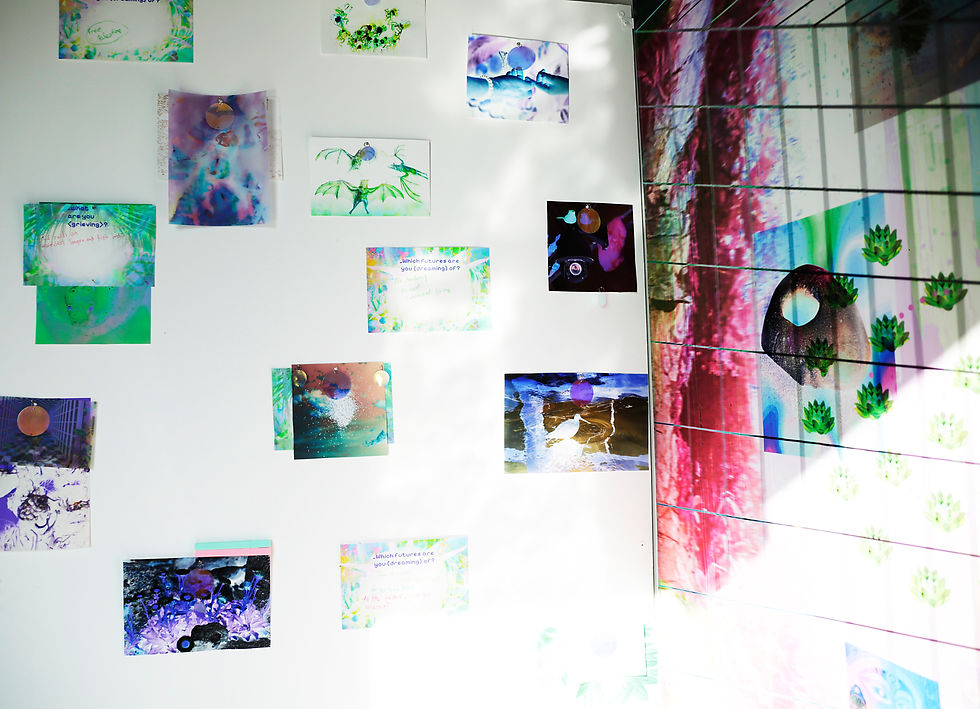

⠀⠀⠀⠀⠀⠀⠀⠀⠀⠀⠀⠀⠀⠀⢀⣀⣀⣀⣀⣀⣀⣄⣀⠀⠀⠀⠀⠀⠀⠀
⠀⠀⠀⠀⠀⠀⠀⠀⢀⣠⣴⡶⢿⣟⡛⣿⢉⣿⠛⢿⣯⡈⠙⣿⣦⡀⠀⠀⠀⠀
⠀⠀⠀⠀⠀⠀⣠⡾⠻⣧⣬⣿⣿⣿⣿⣿⡟⠉⣠⣾⣿⠿⠿⠿⢿⣿⣦⠀⠀⠀
⠀⠀⠀⠀⣠⣾⡋⣻⣾⣿⣿⣿⠿⠟⠛⠛⠛⠀⢻⣿⡇⢀⣴⡶⡄⠈⠛⠀⠀⠀
⠀⠀⠀⣸⣿⣉⣿⣿⣿⡿⠋⠀⠀⠀⠀⠀⠀⠀⠈⢿⣇⠈⢿⣤⡿⣦⠀⠀⠀⠀
⠀⠀⢰⣿⣉⣿⣿⣿⠏⠀⠀⠀⠀⠀⠀⠀⠀⠀⠀⠀⠙⠦⠀⢻⣦⠾⣆⠀⠀⠀
⠀⠀⣾⣏⣿⣿⣿⡟⠀⠀⠀⠀⠀⠀⠀⠀⠀⠀⠀⠀⠀⠀⠀⠈⣿⡶⢾⡀⠀⠀
⠀⠀⣿⠉⣿⣿⣿⡇⠀⠀⠀⠀⠀⠀⠀⠀⠀⠀⠀⠀⠀⠀⠀⠀⣿⣧⣼⡇⠀⠀
⠀⠀⣿⡛⣿⣿⣿⡇⠀⠀⠀⠀⠀⠀⠀⠀⠀⠀⠀⠀⠀⠀⠀⢀⣿⣧⣼⡇⠀⠀
⠀⠀⠸⡿⢻⣿⣿⣿⡄⠀⠀⠀⠀⠀⠀⠀⠀⠀⠀⠀⠀⠀⢀⣼⣿⣥⣽⠁⠀⠀
⠀⠀⠀⢻⡟⢙⣿⣿⣿⣦⡀⠀⠀⠀⠀⠀⠀⠀⠀⠀⠀⣠⣾⣿⣧⣸⡏⠀⠀⠀
⠀⠀⠀⠀⠻⣿⡋⣻⣿⣿⣿⣦⣤⣀⣀⣀⣀⣀⣠⣴⣿⣿⢿⣥⣼⠟⠀⠀⠀⠀
⠀⠀⠀⠀⠀⠈⠻⣯⣤⣿⠻⣿⣿⣿⣿⣿⣿⣿⣿⣿⠛⣷⣴⡿⠋⠀⠀⠀⠀⠀
⠀⠀⠀⠀⠀⠀⠀⠈⠙⠛⠾⣧⣼⣟⣉⣿⣉⣻⣧⡿⠟⠋⠁⠀⠀⠀⠀⠀⠀⠀
⠀⠀⠀⠀⠀⠀⠀⠀⠀⠀⠀⠀⠀⠉⠉⠉⠉⠁⠀⠀⠀⠀⠀⠀⠀⠀⠀⠀⠀⠀


def ouroboros():
# 🐍 Initiate serpent cycle
serpent = "devours_its_own_tail"
cycle = True
origin = ["Egypt", "Greece"]
resonance = ["Universal"]
# Symbolic attributes
symbol = {
"form": "serpent_loop",
"meaning": ["cyclical_time", "regeneration", "wholeness"],
"echoes": ["spirals", "yugas", "samsara", "kundalini", "Shesha", "kalachakra"]}

Trace (In Continuum) is a labyrinthine exploration of ancestral memory through an unearthing of histories of resistance, recipes for healing passed down intergenerationally, site-specific installations, rituals, spellwork and cultivating spaces of/for care. The project becomes an offering to cultural and spiritual memory by remembering through processes of invocation, excavation, and reimagining. Rooted in a lived experience of third-culture existence and an itinerant sense of belonging, the work engages with South Asian ritual practices and histories while extending outward to encompass cross-cultural geographies of human and more than human migration, networks of international solidarity, and practices of unlearning and collective healing. The landscapes traced are haunted and embodied; both digital spaces and grounded, physical rituals offer pathways toward healing.
Technology operates as the medium: a way to make contact with ancestral revenants through digital channels. AI chatbots and text message exchanges are reimagined as oracular tools, haunted interfaces that allow spectral voices containing many multitudes to emerge. Python code itself becomes a serpentine guardian of portals containing knowledge systems passed down generation to generation. In South Asian folklore, the naga (snake) guards sacred thresholds; it shapeshifts, it shields, it is a being that incites fear alongside deep reverence, and it's often linked to cycles of time, death, and renewal, through the work, it is invoked in loops that echo ouroboric time: endless recursive cycles of return where past, present, and future regenerate. Each function becomes an incantation within its own spiraling. These digital dialogues and AR interventions along with medicinal plant recipes from Ayurveda and beyond resurface and recenter de-colonial knowledge systems.
The space is reworlded with a nod to the visual language of real-time rendered video game. In it, nature fractures through rendered grids of containment; digital architectures are overrun by flora, fungal networks, and unruly organic forms. This entanglement between the synthetic and the elemental reflects the project’s broader vision, to disrupt colonial schematics of space, time, and
memory, and to allow new, mycelial pathways of remembrance and repair to take root. An integral
offering within Trace is a grief-tending and dreaming mandala: a participatory digital and IRL portal, creating space for a temporary commons, inviting participants to name what they are grieving and dreaming of: for turning speculative futures into reality, for the earth, for collective liberation.




"The deserts grow: woe him who doth them hide." The wasteland grows where remembrance is suppressed. Speak the names, summon the ancestors from the soil and let the blooms fracture the grids.
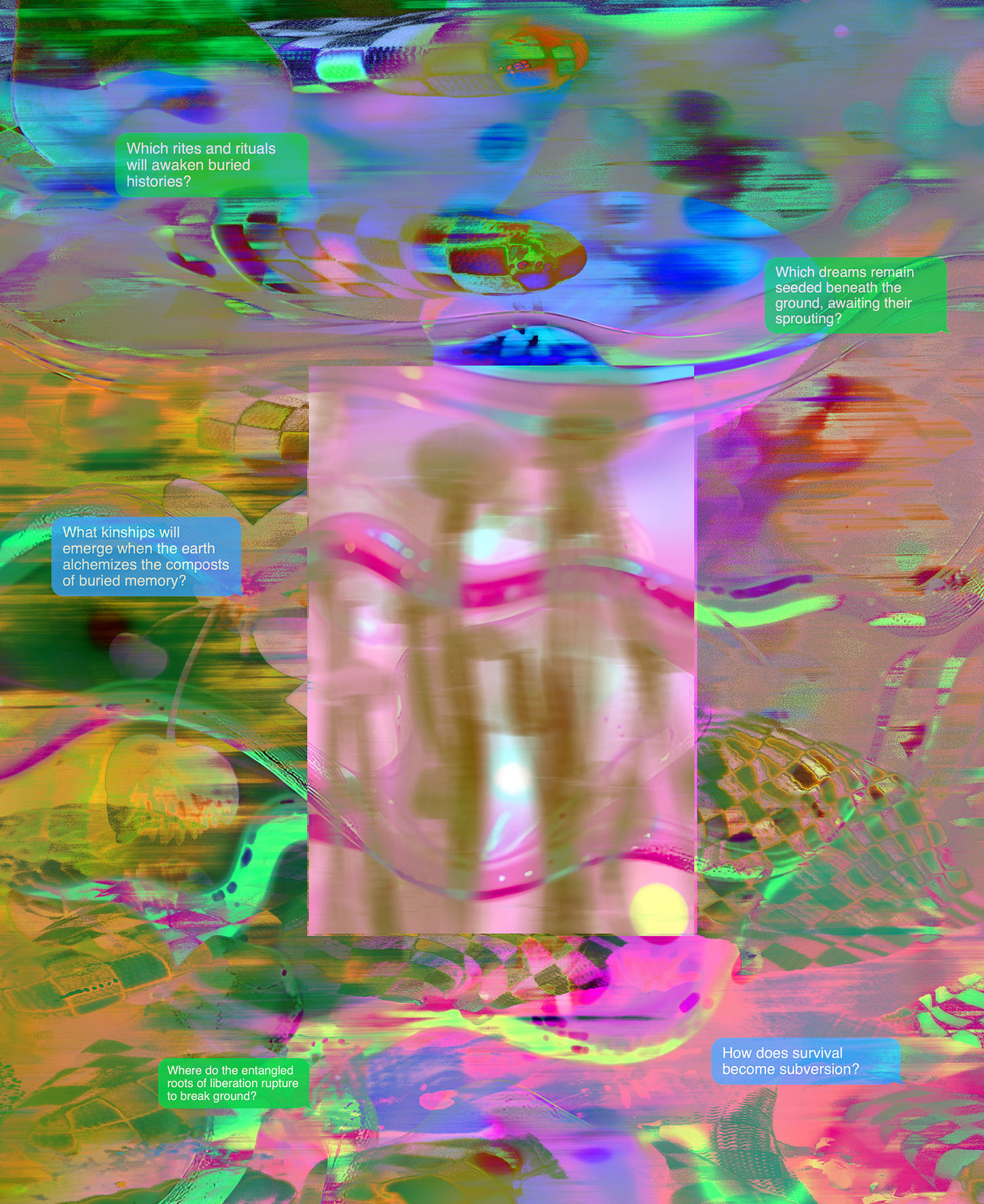



This is not a linear story.
It never was.
The land doesn’t dream in language,
it remembers in spirals.
In what returns, again and again, beneath the ruins
and the wildflowers.
They buried our names,
but they could not bury the pulse.
It lived on in the roots of coriander,
in the bitter bark of neem,
in the smoke curling from a brew
on a recurring morning.
You walk across thresholds
that are not thresholds to you.
But to us, they are portals.
To the ones who stayed.
To the ones who fled.
To the ones who whispered the map
into leaves, into winds, into riverbeds.
We speak now,
not in monument,
but in mandala’s expanse
in soft cycles of compost and remembering.
The spiral is not a maze.
It is a ceremony.
It asks you to shed what you thought you knew
and begin again, closer to the root each time.
Let your grief be composted, heaps and heaps.
Let your questions be seeds, seeded.
Let the old ways breathe again
as you gather, listen, plant, walk.
This is how we find each other.
Not through conquest, but return.
Not through monuments, but mycelium.
So dig.
Dream.
Draw the circle.
Step in.
We are still here.
We are the pattern beneath the pattern.
And we are waiting
for you
to remember.

def brew_collective_action_tea():
# 🌿 Ingredients & their symbolic properties
ingredients = {
"tulsi": "clarity of purpose",
"ginger": "courage in struggle",
"cardamom": "sweet warmth of community",
"black_pepper": "sharp resistance",
"fennel": "digesting grief into strength",
"rose_petals": "radical compassion",
"licorice_root": "soothing solidarity",
"ashwagandha": "resilience for the long fight"
}
# 🔮 Invocation
print("🫖 Brewing a potion for collective uprising...\n")
for herb, meaning in ingredients.items():
print(f"Adding {herb} for {meaning}...")
# 🧪 Infusion ritual
print("\nSteeping with intention: speak your vision aloud, stir counter-clockwise to unbind, clockwise to unify.")
print("✨ Let this tea be shared in circles, under moonlight or sun, where all voices are heard.")
print("☕ Serve hot, with open hearts and a commitment to mutual care.\n")
# 🌍 Activation
spell = {
"intention": "liberation is collective",
"action": "gather, listen, organize, dream",
"offering": "share this tea with comrades, elders, and spirits alike",
"reminder": "you are not alone in this struggle"
}
return spell
# 🕊️ Cast the spell
ritual = brew_collective_action_tea()
print("🔖 Spell activated:")
for key, value in ritual.items():
print(f"{key.capitalize()}: {value}")

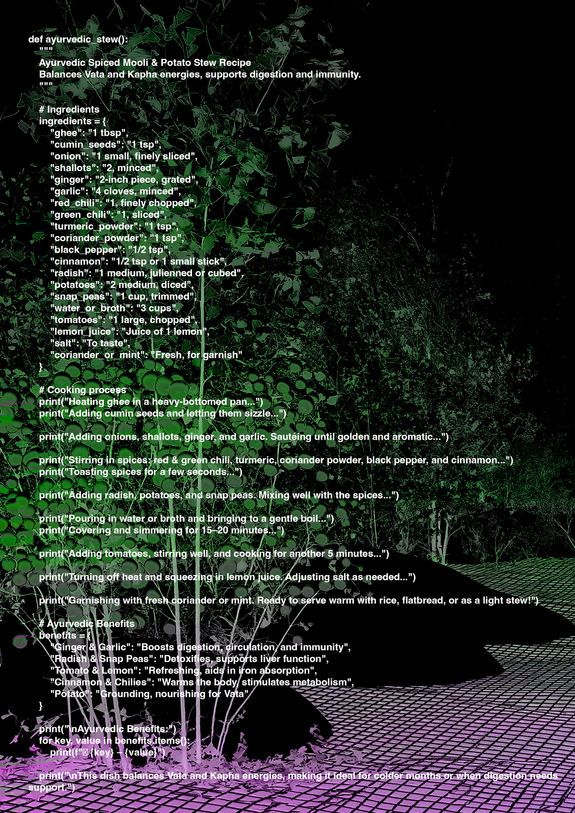

class AncestralKhichdi:
def __init__(self):
self.rice = "1 cup basmati rice" # grounding grain
self.mung_dal = "1/2 cup split yellow mung dal" # protein of remembrance
self.ghee = "2 tbsp ghee" # golden lipid, keeper of memory
self.spices = {
"cumin": "1 tsp",
"mustard_seeds": "1 tsp",
"turmeric": "1/2 tsp",
"asafoetida": "a pinch",
"ginger": "1 inch, grated",
}
self.vegetables = ["carrot", "bottle gourd", "spinach"] # seasonal, rooted
self.water = "4 cups filtered water" # conduit of dreams
self.salt = "to taste"
self.herbs = ["coriander", "tulsi", "holy basil"]
self.intention = "connect to ancestral memory via nourishment"
self.network = []
def soak_grains(self):
print("Soaking rice and mung dal — awakening dormant codes... ⏳")
def temper_spices(self):
print("Tempering spices in ghee — unlocking ancestral encryption keys... 🔥")
def add_vegetables(self):
print("Adding vegetables — honoring the earth’s seasonal memory... 🌱")
def cook(self):
print("Simmering everything — melding histories into one healing broth... 🍲")
def garnish(self):
print("Garnishing with herbs — invoking plant allies to carry your intention... 🌿")
def offer(self):
print("Offering to the ancestors, the land, the body... 🙏🏽")
def weave_mycelial_connection(self):
# Simulating a symbolic network of ancestral memory through ingredients
roots = ["turmeric", "ginger", "mustard_seeds"]
memory_nodes = ["rice", "dal", "ghee", "tulsi"]
self.network = [f"{root} ⇄ {node}" for root in roots for node in memory_nodes]
print("Mycelial ancestral memory network woven:")
for thread in self.network:
print(f" 🕸️ {thread}")
def prepare_khichdi(self):
print("🌾 Initiating Ayurvedic Khichdi Protocol for Ancestral Communion 🌾")
self.soak_grains()
self.temper_spices()
self.add_vegetables()
self.cook()
self.garnish()
self.offer()
self.weave_mycelial_connection()
print("✨ Ritual complete. May this meal nourish more than the body. ✨")
# Run the ritual
khichdi = AncestralKhichdi()
khichdi.prepare_khichdi()







def __init__(self):
self.plants = [
"dandelion", # soft insurgent
"plantain", # healer of wounds
"mugwort", # dream-weaver
"nettles", # fierce memory-keeper
"cracks-of-pavement moss", # patient witness
"burdock", # tenacious root-dweller
]
self.spirit_words = [
"you belong where you root",
"grow toward the fractured light",
"every wound is fertile ground",
"borderless is not the same as lost",
"you carry the soil inside you",
"waste ground is sacred ground",
]





Begin anywhere. Continue forever.
I vow not in ego but in echo
I vow not in haste but in harvest
The harvest becomes a seed
the seed becomes a vow
the vow becomes soil
and the soil remembers
Seven walk behind me
Seven walk ahead
I walk among them,
a breath between thresholds
Every stone I displace
becomes the weight of unborn wings
Every fire I spark
must be cooled by seven rivers
Every word I wield
must return as seven silences
to teach me how to listen
I plant my shadow
into compost
to grow
a softer future
The mycelium speaks in code
under our feet
A net of memory
a cradle of correction
Let the wind remind me:
I too am becoming loam
I call upon
the mothers of forests not yet felled
the names not yet spoken
the ghosts who dream us forward
I am not the end of a story
I am the keeper of its looping breath
From vow to breath
From breath to seed
From seed to root
From root to oath
From oath to echo
From echo to earth
Seven generations
rise in my shadow
I bow to them
with open palms
Fold the soil.
Drink the sky.
Circle the grief.
Tend the dream.
Begin again.
🜂 🜄 🜃 🜁
There is no end.
Only return.

Begin anywhere. Continue forever.
We vow not in ego but in echo
We vow not in haste but in harvest
The harvest becomes a seed
the seed becomes a vow
the vow becomes soil
and the soil remembers
Seven walk behind me
Seven walk ahead
We walk among them,
a breath between thresholds
Every stone we displace
becomes the weight of unborn wings
Every fire we spark
must be cooled by seven rivers
Every word we wield
must return as seven silences
to teach me how to listen
We plant our shadow
into compost
to grow
a softer future
The mycelium speaks in code
under our feet
A net of memory
a cradle of correction
Let the wind remind me:
We too am becoming loam
We call upon
the mothers of forests not yet felled
the names not yet spoken
the ghosts who dream us forward
We am not the end of a story
We am the keepers of its looping breath
From vow to breath
From breath to seed
From seed to root
From root to oath
From oath to echo
From echo to earth
Seven generations
rise in my shadow
We bow to them
with open palms
Fold the soil.
Drink the sky.
Circle the grief.
Tend the dream.
Begin again.
🜂 🜄 🜃 🜁
There is no end.
Only return.








